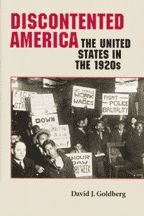It was a decade of great heroes like Babe Ruth and Charles Lindbergh, and of passive leaders like Warren Harding and Calvin Coolidge. The exuberant freedom of flappers drinking bathtub gin and dancing the Charleston did little to counter such powers of oppression as the rapidly rising Ku Klux Klan. Only the fictional wealth of F. Scott Fitzgerald's Jay Gatsby survived the stock market crash unscathed; by the end of the decade, the comic adventures of Charlie Chaplin's "little tramp" bore faint resemblance to the grim realities faced by countless destitute Americans.
Too often, notes historian...
It was a decade of great heroes like Babe Ruth and Charles Lindbergh, and of passive leaders like Warren Harding and Calvin Coolidge. The exuberant freedom of flappers drinking bathtub gin and dancing the Charleston did little to counter such powers of oppression as the rapidly rising Ku Klux Klan. Only the fictional wealth of F. Scott Fitzgerald's Jay Gatsby survived the stock market crash unscathed; by the end of the decade, the comic adventures of Charlie Chaplin's "little tramp" bore faint resemblance to the grim realities faced by countless destitute Americans.
Too often, notes historian David Goldberg, the mythic allure of the "Roaring Twenties" has deafened our ears to the real voices of those who lived through the decade. In Discontented America, he integrates social and political history to provide a new take on the 1920s—an account deeply rooted in the perspectives of that time. Goldberg argues that this contentious and fascinating decade should be viewed now as it was viewed then, as a distinctive postwar period, during which many of the conflicts generated by World War I continued to reverberate throughout American society.
As America sought to step back from the leadership role it had taken in the Great War, Goldberg explains, the nation faced internal battles over women's suffrage, prohibition of the sale of "intoxicating beverages," the specter of communism, and the declining power of labor unions. Large numbers of African Americans migrated from the southern states to the north in search of employment and a better life, and at the same time, there was another heavy wave of newcomers from overseas. These, Goldberg concludes, were the issues that preoccupied serious Americans, and their concern is reflected in the federal legislation of the period, from constitutional amendments providing for prohibition and women's suffrage to the National Origins Act, meant to curtail immigration from nonwestern European countries.
"The 1920s involved a time of confronting (or sometimes, ignoring) profound social problems, fears, and anxieties that had nagged the national consciousness for decades. David Goldberg very properly calls it a time of discontent, and in this work he thoroughly probes much of the underside of life that pitted Americans of differing classes, ethnicity, and religion against one another... As Goldberg notes, the Great Depression exposed underlying fallacies and weaknesses in the economy and provided the occasion for the great political and social transformation of the twentieth century. The achievements of the 1920s are long behind us, but the lessons of unbridled capitalism, intolerance, and the clashes between traditionalism and modernism very much remain."—from the foreword by Stanley I. Kutler






